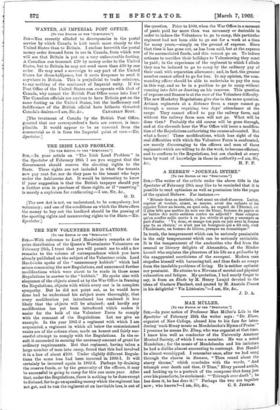THE NEW VOLUNTEER REGULATIONS.
[To THE EDITOR OP TEE "SPECTATOR."1 SIE,—With reference to Lord Hardwicke's remarks at the prize distribution of the Queen's Westminster Volunteers on February 28th, I trust that you will permit me to add a few remarks to the volume of correspondence which you have already published on the subject of the Volunteer crisis. Lord Hardwicke spoke of the "unnecessary hubbub" which had arisen concerning the new Regulations, and announced further modifications which were about to be made in those same Regulations in answer to the "hubbub." He spoke also with eloquence of the objects aimed at by the War Office in framing the Regulations, objects with which every one is in complete sympathy. But he did not point out, as he would have done had he understood his subject more thoroughly, that every modification yet introduced has rendered it less likely that the objects will be attained; and hardly any modification has yet been introduced which makes it easier for the bulk of the Volunteer Force to comply with the remnant of the Regulations. Let me give an example. In the year 1901-2 a regiment with which I am acquainted, a regiment in which all below the commissioned ranks are of the artisan class, made an honest and fairly suc- cessful attempt to comply with the Regulations. In the re- sult it succeeded in earning the necessary amount of grant for ordinary requirements. But that regiment, having taken a large number of men into camp, found that this had involved it in a loss of about £100. Under slightly different Regula- tions the same loss had been incurred in 1900-1. It will certainly be incurred again in 1902-3. Perhaps by draining the reserve funds, or by the generosity of the officers, it may be successful in going to camp for this one more year. After that, under the Regulations, there is nothing to be done except to disband, for to go on spending money which the regiment has not got, and to run the regiment at an inevitable loss, is out of the question. Prior to 1900, when the War Office in a moment of panic paid far more than was necessary or desirable in order to induce the Volunteers to go to camp, this particular regiment had not been able to go out for a week at a time for many years,—simply on the ground of expense. Since that time it has gone out, as has been said, but at the expense of its accumulated funds, and this cannot go on. To induce artisans to sacrifice their holidays to Volunteering they must be paid ; in the experience of the regiment to which I allude they can be induced to go to camp by the ordinary pay of their rank with separation allowance ; and, in fact, the greater number cannot afford to go for less. In my opinion, the com- manding officer should be able to undertake to pay the men in this way, and so be in a position to go to camp without running into debt or drawing on his reserves. This question of expense and finance is at the root of the Volunteer difficulty. The new Musketry Regulations give rise to the same question. Artisan regiments at a distance from a range cannot go through a course requiring two days' attendance at the range. They cannot afford to pay the railway fares, and without the railway fares men will not go. What will be done then? Probably the old course will be gone through, and at the eleventh hour the War Office will issue a modifica- tion of the Regulations authorising the course advocated. But what a farce ! These modifications, which lose sight of the real difficulties with which the Volunteer Force is confronted, are merely discouraging to the officers and men of those regiments which are willing to do the work, to become efficient, and to conform to the Regulations, but are checked at every turn by want of knowledge in those in authority.—I am, Sir,
H. F. P.










































 Previous page
Previous page